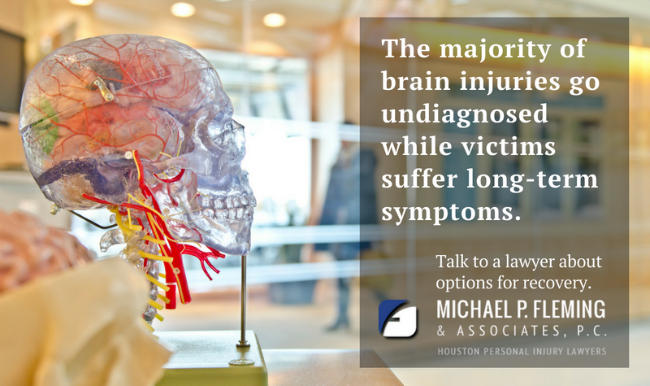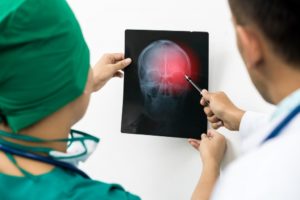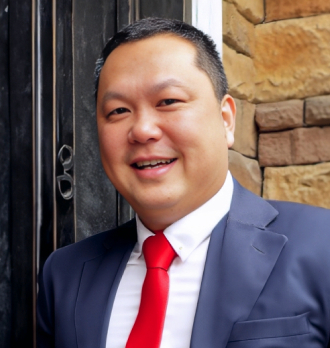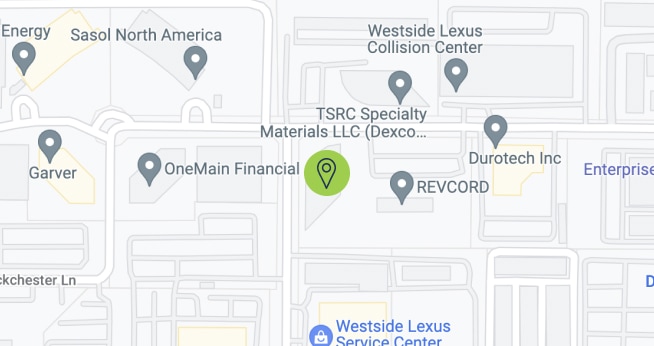Houston Brain Injury Lawyer

As the command center for the central nervous system, the human brain is a remarkably complex organ. Any injury to the brain can have profound effects on a person, possibly affecting their ability to move, communicate or perform many other functions. A traumatic brain injury (TBI) usually refers to a brain injury that was caused by a sudden and violent blow to the head.
Bruising, torn tissue, and bleeding can cause serious and lasting harm, while other TBIs may involve objects penetrating the skull and damaging the brain. One of the best things you can do after suffering a brain injury is to talk to a traumatic brain injury lawyer right away.
Have You Suffered a Head Injury in Houston?
For people who’ve sustained head injuries, it’s not so easy. Injuries involving the brain can be complicated. You may have mild to severe symptoms which affect you immediately and fade away quickly or you may have symptoms that are delayed and linger on endlessly. Whether you’re a parent, coach, or trainer, identifying the signs and symptoms of a brain injury is critical to ensuring that a child, or a player, gets the urgent care they need after a concussion.
Mild Brain Injury Symptoms
There can be many causes of a mild brain injury that result in bothersome symptoms that are thankful, in most cases, short-lived. These symptoms are often the result of everyday events; a slip & fall on black ice in winter, falling off your bike in summer, or the result of horseplay with a group of friends.
Mild brain injury symptoms include:
- Intermittent headaches that come and go
- Mild dizziness or lightheadedness
- Moderate ringing in the ears, like the feeling you get after attending a loud concert
- Feeling nauseous
- Trouble sleeping
Severe Brain Injury Symptoms
Serious head injuries, not surprisingly, arise from accidents or events that cause significant trauma to the head. These can be closed head injuries, such as those suffered in a rear-end collision at high speed, an open head injury from a gunshot wound, or a vicious hit from a blunt object.
Those who’ve suffered from a horrible accident, generally experience more severe brain injury symptoms such as:
- Loss of consciousness
- Seizures or convulsions
- Difficulty keeping their balance, lack of coordination
- Serious nausea and vomiting
- Constant headaches that don’t go away
- Amnesia and memory loss
- Blurred vision and an inability to focus
- Agitated moody behavior
- Feeling confused and disoriented
Victims of serious car accidents have been known to report symptoms months or years later including; slurred speech, trouble breathing, numbness in their hands, and an inability to recognize a feeling of hunger. Severe brain injuries require significant time to recover.
When do Brain Injury Symptoms Occur?
 Most of the time symptoms present themselves immediately after the injury. In addition to the pain, you’ll likely suffer from a headache, feel dizzy, and in some cases nauseous. You will probably have trouble sleeping in the nights following the event and may experience a general lack of concentration. If the injury isn’t serious, you’re lucky, these symptoms should be short-lived.
Most of the time symptoms present themselves immediately after the injury. In addition to the pain, you’ll likely suffer from a headache, feel dizzy, and in some cases nauseous. You will probably have trouble sleeping in the nights following the event and may experience a general lack of concentration. If the injury isn’t serious, you’re lucky, these symptoms should be short-lived.
In some cases, those suffering from a brain injury may appear to be fine immediately after the event only to experience delayed symptoms. No matter how you feel you should get checked out by a physician. If you suffered a brain injury and begin to have symptoms weeks later you may not relate those symptoms back to your accident. Your family and friends may be the first to notice that emotionally you’ve changed. They may find that your mood changes quickly now and that you’re irritable whereas before you were very even-tempered and slow to get annoyed at anything.
It’s important to seek medical attention soon after the injury. Doctors can schedule you for an MRI or CT scan to try to pinpoint the injury and its severity. Doctors can also recommend some type of therapy to deal with the physical, behavioral, and emotional symptoms that accompany a brain injury.
Symptoms of Brain Injuries in Sports
Coaches for amateur and professional teams have seen firsthand the difficulties in recognizing concussions. After a hard contact during play, one that involves a hit to the head or the head of a player hitting the floor, trainers will go through a series of evaluations. Sometimes trainers observe no signs of a concussion or head injury only to see the player develop symptoms of a brain injury later.
Coaches and trainers need to be educated on recognizing the signs and symptoms of a brain injury. Players who’ve been injured during play may exhibit:
- Memory or concentration problems and an inability to recall specific plays. Coaches may see this at practice in the days following a head injury or in the next game.
- Slow reaction times can be another sign. A player who never misses a pass may suddenly start to cause turnovers. Erratic play can be a sign of a player who has lingering effects from a brain injury.
- Lack of energy and problems sleeping. A team member who normally plays with high energy may now seem lethargic on the field of play because of poor sleep patterns brought on by a concussion.
Coaches, trainers, family, and friends should all take part in candidly assessing the player in the days and weeks after the injury. Treating a brain injury begins with recognizing the symptoms, whether they appear immediately or in the weeks and months that follow.
When to Worry that Your Child Has Symptoms of a Head Injury
Symptoms of a brain injury in children are harder to discern simply because children aren’t able to communicate how they feel like adults can. Parents should be on the lookout for changes in behavior that often manifest themselves after a brain injury.
Parents may be the best at diagnosing a head injury, such as a concussion because they know how their kids behave, their sleep schedule, eating habits, temperament, and how they get along with their friends. Parents can tell if something isn’t right. If a child or teenager, who plays on the school team, begins to have headaches, exhibits sudden changes in behavior and moodiness, becomes forgetful, or has lapses in recalling a teammate’s or coach’s name, these can all be signs of a concussion or some other type of brain injury.
If parents are aware of the signs and symptoms of head injuries, they can then act on them. Doctors will tell you that parents are the best when it comes to knowing how their child feels and when symptoms are a cause of concern.
Don’t brush off and ignore the symptoms of a brain injury. See a doctor and get a proper diagnosis. If an accident was the cause, call the personal injury attorneys at Fleming Law. A lawyer can advise you for free and tell you if it’s worth pursuing a claim against an insurance company. Send us a message on our contact page or call us at 713-221-6800.
What Should I Do After a Traumatic Brain Injury?
If you or your loved one suffered a TBI in an accident caused by another party’s negligence in Houston or a surrounding area, a Houston brain injury attorney at Fleming Law wants to help you. We take brain injury cases seriously, and we have the experience and resources you need on your side to hold the party who harmed you responsibly. Our attorneys can review your case when you call or contact us online to take advantage of a free consultation.

What Is a Traumatic Brain Injury?
The Centers for Disease Control and Prevention (CDC) defines a TBI as “a disruption in the normal function of the brain that can be caused by a bump, blow, or jolt to the head, or penetrating head injury.” To diagnose TBI, healthcare providers often use tests such as the Glasgow Coma Scale (GCS).
GCS is a neurological scale used to assess the impairment of the conscious state of a person with a brain injury. Eye-opening, best motor response, and best verbal response are the three measures used to score responses. A total patient score of 3 indicates deep unconsciousness, while a score of 14 (on the original scale) or 15 (on the modified schedule) indicates a healthy individual.
Physical symptoms of TBI often include:
- Blurred vision
- Migraine headaches
- Loss of coordination
- Repeated vomiting or nausea
- Loss of consciousness
- Seizures
- Dizziness
- Fluids draining from the nose or ears
- Weakness or numbness in fingers and toes
- Convulsions.
Mental or cognitive symptoms of TBI can also include:
- Irritability
- Short-term memory loss
- Amnesia
- Changes in appetite
- Disorientation
- Depression
- Agitation
- Profound confusion
- Slurred speech.
A TBI diagnosis also takes into account other factors such as periods in which a person was unconscious and/or experienced memory loss.
What are the Different Types of Traumatic Brain Injury?
A TBI typically takes one of five forms:
 Concussion
Concussion
Long considered to be simply a temporary ailment largely limited to athletes, concussions are now recognized as being potentially serious brain injuries. The most common causes include direct blows to a person’s head or any violent shaking of the head. With some concussions, blood vessels in the brain can be stretched, and cranial nerves sustain damage. It is important to note that concussions do not always appear in diagnostic imaging tests, and a concussion could cause diffuse axonal-type injury leading to temporary or permanent damage.
Contusion
Most often the result of direct impact to the head, a contusion is a bruise of the brain causing bleeding. Large contusions may require surgical removal.
Coup-contrecoup
This type of severe TBI involves contusions on both the original point of impact and the opposite side of the brain. The first blow causes a contusion, while another contusion forms when the brain slams into the skull.
Diffuse axonal
Diffuse axonal injuries are the result of brain structures tearing as the result of shaking or strong rotational forces in which the brain does not move as fast as a skull.
Penetration
A penetrating injury involves an object forcing its way into the brain.
TBIs are not the same as acquired brain injuries. TBIs involve external trauma, while acquired brain injuries are usually the result of medical conditions such as hypoxia, strokes, or tumors.
What are Common Causes of Head Injuries in Texas?
The most common cause of a TBI is a sudden blow to a person’s head. The symptoms are not always immediately apparent. Some of the most frequent causes of TBIs that our Houston brain injury attorneys have seen over the years at Fleming Law include:
- Motor vehicle accidents
- Motorcycle accidents
- Bus accidents
- Semi-truck accidents
- Bicycle accidents
- Construction accidents
- Boating accidents
- Dog bite
- Swimming pool accidents
- Slip and fall
- Dangerous or defective products
- Sexual assault
- Birth injury
- Drunk driving accidents
Again, the symptoms of a TBI are not always immediate. Some people may not begin to feel the effects for several days or weeks, and they may not know what caused their condition. The often-misunderstood symptoms of TBIs underscore the importance of getting medical attention following an accident. A TBI is an injury you want to have identified and properly treated right away in case you need evidence in a brain injury lawsuit later on. Contact our Houston brain injury attorneys today.
What are the Long-Term Effects of Traumatic Brain Injury?
All TBI cases are different. In many cases, victims deal with the physical, cognitive, and psychological consequences of these types of injuries. Some TBI victims cannot return to their former jobs because of the effects of their brain injuries, and some never maintain gainful employment again after suffering their injuries. Other victims require constant, 24-hour care and assistance with daily activities and various needs.
TBI treatment typically encompasses multiple different approaches, some of which can be very costly.
Possible rehabilitation for TBI victims includes, but is not limited to:
- Acute rehabilitation — Hospital or another inpatient setting with a focus on daily living activities
- Post-acute rehabilitation — Residential rehabilitation or transitional living facility with more comprehensive rehabilitation that focuses on intensive therapy
- Sub-acute rehabilitation — Nursing home facility programs for victims who are struggling to make functional gains or need less intensive rehabilitation
- Day treatment — Group setting rehabilitation during daytime hours, so that a victim can return home for the evening
- Outpatient therapy — Continuing treatment provided following any type of acute rehabilitation.
TBI treatment services also focus on self-care, mobility and socialization skills, communication and cognitive functions, and psychological care in addition to physical care and pain management. Specific programs also offer speech and vocational training for victims.
What Steps Should You Take After You or a Loved One Suffers a TBI in Houston?
 The initial symptoms of head and brain injuries are often minor. So, many people do not take medical care precautions until the symptoms become more persistent or severe. If you are involved in an accident, you should seek medical attention right away. Go to a hospital even if you do not think that you were hurt. It is always best to play it safe and let a medical professional perform a proper evaluation. When you suspect that somebody has suffered a head injury, do what you can to keep the person still. If the person was wearing a helmet, do not remove it.
The initial symptoms of head and brain injuries are often minor. So, many people do not take medical care precautions until the symptoms become more persistent or severe. If you are involved in an accident, you should seek medical attention right away. Go to a hospital even if you do not think that you were hurt. It is always best to play it safe and let a medical professional perform a proper evaluation. When you suspect that somebody has suffered a head injury, do what you can to keep the person still. If the person was wearing a helmet, do not remove it.
If it is possible, you should try to take pictures of the scene of your accident. Get photographs of everything involved in the accident, including the people, and take pictures from different angles and distances. If any people saw the accident, ask them for their names and phone numbers. These individuals could end up becoming beneficial witnesses later on.
If a person is bleeding, you should apply pressure to the wound. However, you should not apply direct pressure if you suspect a skull fracture. CPR may be required in some circumstances.
What Compensation Can TBI Victims Recover in Texas?
We understand the life-changing impact of TBIs on Texas brain injury victims and their families. If you or a loved one suffered TBI due to someone else’s careless or reckless conduct, you need an experienced Houston brain injury lawyer who will aggressively pursue all compensation that you are due.
Compensation traumatic brain injury victims can recover are:
- Past and future medical expenses
- Lost income
- Diminishment of future earning ability
- Pain and suffering
- Emotional distress
- Loss of consortium
- Punitive damages.
We will preserve, gather and analyze evidence to establish your right to compensation. We may also consult with knowledgeable experts about the cause of the TBI in your case and/or its effect on your health and ability to work and enjoy life as you did before. We will demand full and fair compensation for you during settlement negotiations and, if necessary, we will be ready to fight for you in the courtroom.
Contact Our Houston Brain Injury Attorneys Today
A TBI is an injury that can have a dramatic effect not just on victims but on their entire families as well. Victims could suffer memory loss, and some people become incapable of creating new memories. These frequent and recurring problems complicate daily life and make many daily tasks difficult. The results can be frustrating and challenging to deal with.
During the adjustment to a TBI diagnosis, many families are struggling to pay for the continuing costs of medical care. Their concerns about medical bills are on top of the stress created by the victim’s inability to work.
If you or a loved one suffered TBI, you should not be forced to deal with these circumstances because of someone else’s misconduct. You deserve justice. Contact a Houston traumatic brain injury attorney at Fleming Law today. We can provide a timely and free consultation and help you to understand and explore all of your legal options. We can help you with your personal injury claim and make sure you get financial compensation for your lost wages, medical bills, and even pain and suffering.













